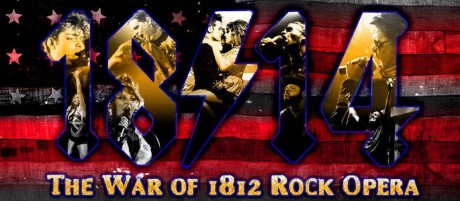What a kick to see this Capital Fringe hit back at it, better and badder. When 1814! The War of 1812 Rock Opera tore up the sweltering Baldacchino Tent in the summer of 2013, DCMetroTheaterArt’s five-star review said, “prepare to sweat, because the music is hot.” Now that the show is rocking an air-conditioned venue in Silver Spring, the music is, incredibly, even hotter.
But hurry, it closes tomorrow.
This ridiculously too-brief run commemorates the bicentennial of the little-known episodes in American history on which the show is loosely based. On August 24, 1814, the British attacked Washington, DC, torched the president’s residence (not yet called the White House) and burned down most other public buildings as well—in total about a tenth of the District. Coincidentally, the return of this full-on rock fest was preceded by the Washington Post‘s publication this week of a primer about those events on the kid’s page—which is worth a look to get the gist of what inspired the creators of 1814! The War of 1812 Rock Opera to let loose some firepower of their own.
Said creators are David Dudley and Dave Israel, who grew up in Baltimore near Fort McHenry, where on September 13, 1814, the American home team routed invading British forces in the “rockets’ red glare” battle that prompted Francis Scott Key to pen “The Star Spangled Banner.” On a hunch that the colorful characters and fierce conflicts in those pivotal war zones “would make a great Tommy-style rock opera,” Dudley and Israel began writing music and lyrics. (Additional lyrics are ascribed to Erik Sunday.)
Last night left no doubt their hunch was spot on. The hour-long show they came up with—smartly directed by Alec Lawson—thrilled an enthusiastic intergenerational audience and sent me onto the street by the end on a high akin to that of headliner band at the 930 Club. The fact that the story of 1814! is all set in these parts is kind of a wonky bonus. Purely on its merits as a rock opera, 1814! has one of the best scores, played by one of the best backup bands, and sung by some of the best vocal talent to be found in the DC/VA/MD theater scene.
Said band consists of David Dudley (guitar, bass), Dave Israel (keyboards, guitar, mandolin), Jim Schaffer (drums), Erik Sunday (bass), and Carl Weigel (guitar).
Said cast is huge—15 plus several swings for various performances—with standouts aplenty. Gaines Johnston (Narrator) performs three poetically expositional interludes—which have some of the loveliest melodies in the show—with a welcoming warmth that steadies the storytelling. The 2013 program credited Dudley and Israel with a book, but the show is now entirely sung-through, with explanatory text crawls projected intermittently on screen. (I didn’t miss the spoken bits at all.) There is a sort of plot that approximates real events, and it helps to have a look at the notes and lyrics that are printed in the program to follow it. But really, this is a pulsing and pounding rock concert. And it’s perfectly okay to get lost in the powerful sounds and performances.
Chris Beck, Doug Balog, and Tom Balog—strumming guitar, banjo, and bass—deliver the rip-roaring “The War Hawks,” which cartoons the rabidly militant faction that narrowly persuaded the young country to go to war with Britain (“If some Eurotrash tries to take what’s mine / He’s gonna be on the fightin’ side of me”). Matt Casella plays the British Army’s Admiral George Cockburn as an arrogant bad boy, preening and strutting about the stage like a mean metalhead and wailing “Too Rockin’ to Loose” (“They call us invicibles / … / It’s a matter of principle / To humble this truculent horde”). (Robert Bradley, the Cap Fringe Cockburn, returns to the role Sunday.)
The song you leave singing (and the one that returns like a prized pet earworm the next morning) is “Big Ass Flag.” It’s based on a quirky historical fact: U.S. Major George Armistead demanded that a huge stars and strips fly over his garrison to send a message of invincibility to the enemy. Armistead’s egoistic lyrics are a giggle (“Our boys just can’t lose if our flag is sufficiently huge / Bigger is better is what I say”). He asks local seamstress Mary Pickersgill for “something extra-large in red, white and blue,” and she caustically calls him on his hubris (“Do we need such a big ass flag? / What’s the deal with this big ass flag? / Can you fend the British off with a giant piece of cloth?”). Corey Hennessey as Armistead and Moira Horowitz as Pickersgill reprise performances that stopped the show last summer and did so again last night, with the audience singing along. Plus their dirty dancing on the “bigger is better” double-entendre was to swoon for.
The story heats up even more. Tim Olewnik as Revolutionary War vet Samuel Smith prances and skips onstage to howl a rousing call to arms in “Black Powder” (“Feelin’ frisky and independent / Come take a taste of my Second Amendment”). Derek Vaughan Brown as British General Ross leads a do-or-die assault in “Baltimore or Hell” that lands him the company of the Devil (Tim Krieder, bedecked in black horns and talons) and a lot of red light. (Throughout, the lighting by Chris Allen underscored the music and action with rock-concert flash, and projections mashed up archival paintings with grabby rock-world graphics that were a light show unto themselves.) Immediately after, Brown as General Ross belts out a ballad called “Empire of Love”; his dramatic shift in tone is stunning.
The finale has the entire ensemble in another singalong anthem, “I’ll Hold My Ground” mixed with more “Big Ass Flag.” It’s all stirringly patriotic, suffused with a national pride arising not from xenophobia or imperialism but from a genuine purity of heart: “I’ll hold my ground / I’ll build it up / If you burn it down / I won’t give up / On my hometown / If you stand by my side / I’ll hold my ground.”
Great rock concerts aren’t supposed to leave you misty eyed, am I right?
Well, this one might.
Running Time: 60 minutes.
1814! The War of 1812 Rock Opera plays through August 24, 2014 at the Silver Spring Black Box Theatre – 8641 Colesville Road, in Silver Spring, MD. Advance tickets may be purchased online.
1814! The War of 1812 Rock Opera can next be seen when it headlines the Hampstead Hill Festival September 14, 2014, in Baltimore, MD.
The Original Cast Recording is available on CD and for download.
______
The performance last night was preceded by a fascinating and lively panel of four eminent historians: Peter Snow, noted BBC personality; Stephen Vogel, former Washington Post reporter and author of Through the Perilous Fight, a new popular history of the Mid-Atlantic campaign; John McCavitt, of the Queen’s University, Belfast, Northern Ireland; and Ralph Eshelman, local historian and author of In Full Glory Reflected.
Panelists tonight August 23rd will be Christopher George, author of Terror on the Chesapeake: The War of 1812 on the Bay, and Robert Reyes, an archivist and preservationist involved in he fight to protect Baltimore’s North Point battlefield.
The panel at tomorrow’s August 24th matinee will bring back Stephen Vogel and Christopher George. All three panels are emceed by Jim Meyer, a Baltimore writer and standup comic who is as informed about the pertinent battles as he is funny at repartee–which is to say: very.
Running Time for the panel: About 40 minutes.





